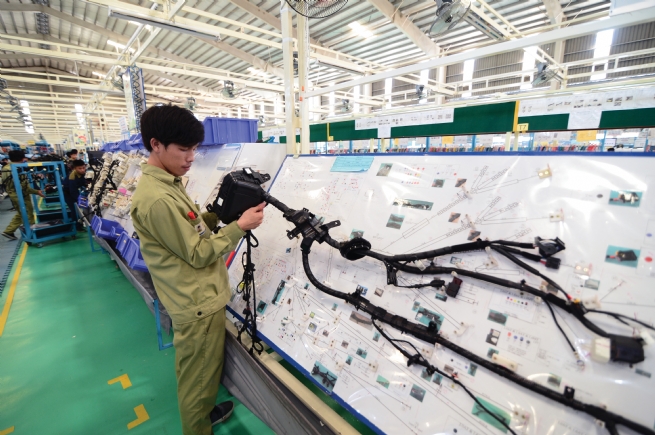Challenges Facing Vietnamese Business Linkages in Global Supply Chains
Most Vietnamese businesses have yet to join the global supply chain led by foreign invested enterprises. Only about 300 out of more than 1,800 supporting industry enterprises supply multinational corporations and FDI firms, mostly providing goods and services with low or simple added value.

Illustrative photo
Lack of close connections
According to Dr. Tran Thi Hong Minh, President of the Institute for Policies and Strategies under the Party Central Committee's Commission for Policies and Strategies, the reason for this situation is that the internal capacity of most Vietnamese enterprises remains weak. Their production and supply capabilities are still limited in terms of price competitiveness, product quality, timely delivery, ability to handle large orders, and access to distribution channels.
For example, in the automobile manufacturing industry, only about 20% of subcomponents are produced domestically, while 80% are imported. In contrast, Thailand and Indonesia produce up to 90% of their subcomponents locally. In Vietnam, although Toyota - a major foreign invested enterprise - has actively promoted localization, it currently works with only 13 purely Vietnamese suppliers.
In addition, domestic suppliers, especially those in supporting industries, lack official channels to access information about the purchasing strategies of FDI enterprises, making it difficult to establish business relationships. Their capacity to receive and adopt technology transfers also remains limited.
Notably, according to Dr. Tran Thi Hong Minh, institutions and policies to promote business linkages remain inadequate. Enterprise development policies have yet to create the most favorable conditions for Vietnamese businesses, especially small and medium-sized enterprises (SMEs), to invest in and enhance their production and business capacity, enabling them to join business networks and participate in domestic, regional, and international production and supply chains.
Meanwhile, Vietnam still lacks specific policies to promote forms of enterprise linkages, especially preferential policies on tax, access to capital, credit guarantees, and production and business premises based on the level of participation in production and supply chain linkages. Current regulations remain insufficiently supportive for businesses to access capital through value chain-based financing mechanisms.
Although challenges remain, Vietnamese enterprises have increasingly diversified their linkages. These include cooperation with businesses in the same industry (horizontal linkages), forming production and supply chains (vertical linkages), investing, contributing capital, buying, selling, merging, forming company groups, and signing strategic cooperation agreements to share markets, information, and research and development. The number of Vietnamese businesses participating in the supply chains of multinational corporations is also rising, occupying both low and high positions within the chains. Connections between state-owned and non-state-owned enterprises have been strengthened through policies promoting equitization and diversification of state-owned enterprise ownership.
In particular, many enterprises in the supporting industry have made deeper inroads into global supply chains by offering multi-component products and high value-added goods. One example is CNS AMURA Precision Co., Ltd, which operates mainly in mechanical processing and precision component manufacturing. The company specializes in mold production, plastic injection, and precision component processing, with partners such as Mitsuba Vietnam Co., Ltd, ITO Corporation, and major export markets including Japan, the EU, the U.S., Australia, and Germany. Another example is Nhat Minh Design Manufacture Co., Ltd, which produces and supplies metal tools, including drill bits, cutting pieces, knife handles, measuring tools, and center drills, for several foreign corporations manufacturing end products, such as Mitsubishi, Okazaki, and Fuji Seiko.
Addressing institutional and legal bottlenecks
In current fast-paced, complex, and unpredictable world, business linkages are becoming even more important as they help expand and diversify markets, connect and realize new business models, share and optimize resource use, minimize risks, and effectively respond to adverse developments - thereby enhancing business competitiveness.
Dr. Tran Thi Hong Minh emphasized that to enhance production and business capacity for participating in business linkages, Vietnam must address institutional, legal, and business environment bottlenecks. It is important to drastically cut and simplify business conditions, streamline administrative procedures, and promote digital transformation through the application of modern information and communication technology and core technologies of the Fourth Industrial Revolution. It is necessary to strengthen property rights protection and improve regulations on the registration of property ownership and usage rights, especially for land, technology, and intellectual property.
In addition, it is essential to develop a modern, synchronized, secure, and effective digital infrastructure to enable state management in a digital environment and achieve administrative reform goals, thereby reducing compliance costs for businesses. In particular, policies supporting businesses, especially domestic SMEs, must be improved in both effectiveness and efficiency. Efforts should focus on boosting competitiveness for small and medium enterprises, prioritizing innovative startups, helping businesses join linkage and value chains, and supporting digital transformation, science, technology, and innovation. Actively considering tax reductions for all SMEs is equally important.
“It is necessary to promote business linkages to form production and supply chains with preferential policies on taxes, access to capital, credit guarantees, and business premises based on the level of participation in these linkages. Foreign investment attraction policies should be adjusted to increase binding requirements on localization rates and the share of products and services provided by Vietnamese small and medium enterprises,” said Dr. Tran Thi Hong Minh. She pointed out the need to foster the growth of large Vietnamese private enterprises that can link, gather, and lead domestic small and medium enterprises in key industries, helping secure the country’s important role in the global supply and value chains. In the coming time, focus should be placed on strong development in semiconductors, advanced electronics, software development and AI, agriculture, green technology and renewable energy, connectivity services (logistics, ICT), and smart infrastructure. Priority should be given to public procurement of products and services from Vietnamese private economic groups, creating favorable conditions for them to participate in public investment projects. Developing a data-sharing mechanism will help businesses easily access market information, industry trends, and cooperation opportunities. The model of industry clusters should also be strengthened and innovated, linking private, state-owned, and FDI enterprises along the value chain.








